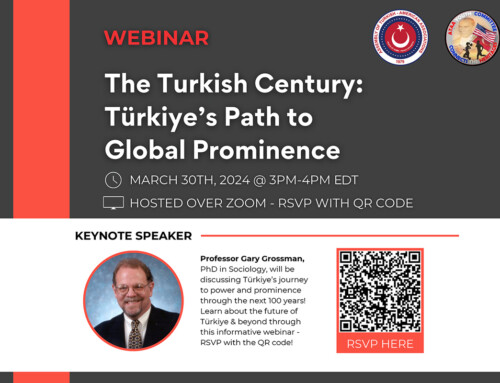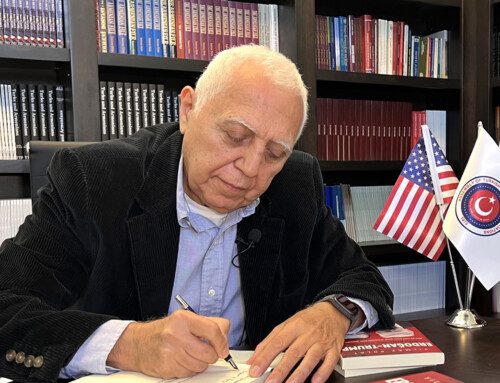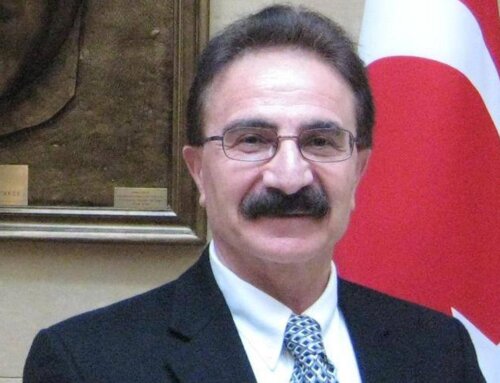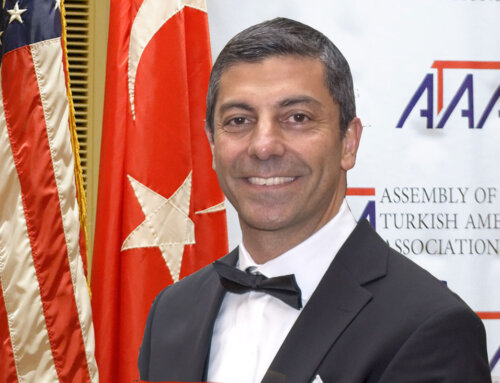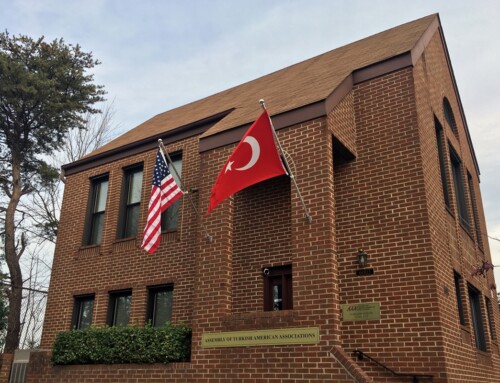Photo Caption: Left to Right) Bircan Ünver, ATAA NY Region VP and the Light Millennium President, Sevgin Oktay, ATAA NY Region Past VP, Burcu Tansu, ATAA California Region VP, and Mrs. Elizabeth J. Oktay.
October 17, 2019 – By Sevgin Oktay, ATAA Past-VP of New York Region, Representative of the Light Millennium to the UN Department of Global Communications.
ATAA officers participated in a Workshop at the United Nations 68th Annual Civil Society Conference held in Salt Lake City, UT during 26-28 August 2019.
The Light Millennium organization being always on the lookout for the future well-being of humanity for current actions, once again shed light-pun intended- on some of the good intentions of the bold United Nations (UN) Sustainable Development Goals(SDGs) that were discussed at the 68th UN Civil Society Conference that was held in Salt Lake City during 26-28 August 2019.
In its Round-Up Release, the UN stated that “At a first-of-its-kind United Nations gathering in the western United States, representatives of non-governmental and faith-based organizations, as well as educators, students and individual activists from Utah and around the world adopted today an outcome document outlining a global vision for inclusive and sustainable cities and communities by 2030, with youth drafting and adopting a stand-alone climate compact.”
Climate Impact is an SDG No. 13 out of the 17 Sustainable Development Goals that were adopted back in September 2015 by the General Assembly building on the principle of “leaving no one behind”, a new Agenda emphasizing a holistic approach to achieving sustainable development for all.
The Light Millennium, a UN associated Non-Governmental Organization (NGO) to the Department of Global Communications (since 2005), being cognizant of how sometimes “road to hell is [may be] paved with good intentions,” presented a Workshop entitled “GREAT GOALS: UNINTENDED CONSEQUENCES,” including a sub-title “ How to handle the complexity of our technology and make true progress for our social and environmental well-being,” which president of The Light Millennium Bircan Ünver laid out in her opening via Run-Down of the Workshop, which also reflected in the preamble of its Workshop Concept as follows:
Despite the huge undertaking of the 2030 Agenda and its 17 Goals, the world in many areas seems to have gone backwards, especially in regard to attaining peaceful, inclusive and diverse societies. Our speakers will assess the various ways we are being held back, sometimes through a basic lack of commitment, and then sometimes through the mis-use, or unexpected consequences of policies pursued in the name of SDGs and articles of the UN Charter, that very often leads to the infringement of other SDGs, or other basic human rights. The invocation of Freedom of Expression, for instance, without regards to laws against hate speech, or of Freedom of Religion, without the proper care for the concept of the separation of powers, are all very short-sighted approaches. And finally the ushering in of new technologies, such as 5G and the Internet of Things, in the name of combatting climate change and moving ahead in nearly all of the SDG goals, is also hiding a darker side that might very well have a severe impact on SDG 3, our right to good health, the right to privacy, and our basic social interaction skills, that many parents lament in their young. All of these illustrate a double-edged sword that can create unforeseen obstacles to the health of our communities. How we handle all of these complexities and take an honest look at our collective endeavors, will all be a part of the questions we pose to the attendees as we brainstorm together on how to be even better problem solvers.
Following president Ms. Bircan Ünver’s welcoming remarks, Mr. Sevgin Oktay, NGO Representative of The Light Millennium to the UN Department of Global Communications & President of TADA (New York) moderated the ensuing panel discussion starting with the first panelist speaker Ms. Julie Mardin, Researcher-Author, Digital Artist and Representative of The Light Millennium to the UN Department of Global Communications (New York). She focused on wireless communications, as the marketplace is set to invest even more deeply into its proliferation, with 5G, the fifth generation of telecommunications, and the internet of things. She presented some of the decades old science on the biological effects of radio frequency radiation, suggesting that in the name of progress, “and a certain kind of progress, driven by industry,” we might be setting ourselves up for the “motherlode” of unintended consequences. Solutions ranged from eradicating conflicts of interest/contractual basis disclosures, to a small tax on cell phones to fund independent research, “harmonizing international standards, and tackling money in politics, so as to ensure true biocompatible solutions.”
Second panelist paper submitted with the following title, “Can responsible consumption pave the way for the eco-sustainability of the future?” by Dr. S. L. Gandhi, International President of Anuvrat Global Organization (ANUVIBHA, India) & Representative to the UN Department of Global Communications was read by Mr. Arvind Vora, ANUVRAT Representative to the UN Department of Global Communications. He gave an overview of overconsumption from the point of view of Dr. Ghandi’s country, India, “tracing the insatiability of human kind’s wants and desires, and the need for material things, especially following the Industrial Revolution and the breakthroughs of modern science, which completely changed the lifestyle of Europe. The seduction of the east by western products and the sense of a need to keep up with the developed world, made the local small businesses of the East irrelevant and led to the spread of a wasteful and ecologically destructive society, as well as to immoral practices. Dr. Gandhi’s solutions rested in the ancient belief system of the Jains and their lessons on living a good life, which might have the answers for how we solve our current crises of over-consumption. Lord Mahavira’s teachings from 2600 years ago actually laid down a blue print for eco-sustainability of the future, and shows an elegant and spiritual solution that provides guidance and enlightens the individual in his every day choices.”
Third panelist speaker, Ms. Jessica Jane Robinson, CEO and founder of Resilience Birthright, Inc. (California) picking up on “overconsumption” and “the insatiability of humankind’s wants and desires” and “and the need for material things,” framed her presentation by asking the question and performed in the theme of “Why Zero Waste,” by pointing to the 30-40% of the food supply going to waste which should be relatively easy to control. Hence individual responsibility to go for “individual needs” instead of “wants.” Ms. Robinson also revealed an invention of her own called “Carbon Calculator App”, which can be used to keep track of one’s own carbon foot-print and take steps to mitigate contribution to environmental pollution. My take-away from her beautiful performance was the case of “just one [plastic] straw” that may break the back of the camel (world) if causes resulting in unintended consequences of technological advances are not proactively checked before being put to use.
Finally, the last speaker was moderator Mr. Sevgin Oktay on the topic of “How to prevent the proliferation of hate speech within the contours of freedom of speech as related to communication technologies in general, and Internet of Things (IoT) in particular?” pointing out that, as another unintended consequence of a well-meant concept, namely the “Freedom of Speech,” could be used as a tool for “Hate Speech” unless it is protected with realistic caveats, specifically proposing an 18th Sustainable Development Goal (SDG) called the “Empathetic Speech.”
Following the speakers, there was a most interesting “interactive Session,” where comments, or actually solutions, if any, were solicited from the attendees to the following questions that were posed by each speaker:
. How to Protect Independent Science and Ensure Our Innovations Are in Tune with Our Health and Human Rights?
. Can Responsible Consumption Pave the Way for the Eco-Sustainability of the Future?
. Why Zero Waste?
. How to prevent the proliferation of Hate Speech within the contours of Freedom of Speech as related to Communication Technologies in general, and Internet of Things (IoT), in particular?
The participation of the attendants in trying to suggest solutions to these questions were rather remarkable. For example, it was suggested that one of the solutions to harmful effects of technological innovations is to have transparency to business plans of corporations. A case in point was the recently found harmful effects of 5G technology. The discussion from the floor was directed towards business plans drawn up for financial gains in mind without regard to the harmful effects on human life. Another example that was mentioned was that even though the Cigarette company research showed the harmful effects of cigarette smoking on human health, that was never considered in their business plan. If business plans and associated studies had been transparent to public, the ensuing health problems would have been prevented.
Another attendee from the floor suggested people should pay attention to individual “needs” than “wants” in response to the question related to “Why Waste?” Still another suggested as a solution, to share more with others to do away with waste.
Another lesson that could be learned was from panelist speaker Julie Mardin, who made reference to Don Quixote where there is value in all people regardless of social standing, worldview, weight, age, etc. Don, who aspires to be a chivalrous knight, shows how ridiculous antiquated beliefs can be to those who have conquered living in the present.
Finally, president Bircan Unver adjourned the workshop with closing remarks and thankyous to more than 40 people who attended the Workshop. Afterwards, there were many photo-op pictures taken for Gallery and the Photo Archive of The Light Millennium.


